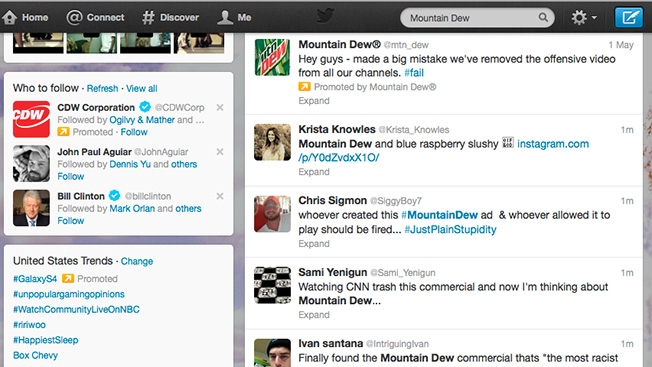
Mountain Dew today bought Promoted Tweets to push its apology for the highly controversial Tyler, The Creator video on Twitter. In a story that was broken by Adweek, the PepsiCo brand pulled its "Felicia the Goat" :60 spot on Wednesday morning due to a slew of accusations that the ad was either racist, misogynist or both.
So was it smart marketing to amplify its Twitter apology with paid media? Or does thePromoted Tweet in people's news feeds seem cynical—as if forgiveness can be bought? We asked a small sample of marketing professionals to weigh in, and their takes varied.
"There may be no tangible [return-on-investment] from putting money behind it, but in this case what it does communicate is how seriously the company is taking the situation," said Sabrina Horn, CEO of public relations agency Horn (formerly Horn Group). "Mountain Dew clearly wants to make sure its audiences know they are sorry. The best thing anyone in a situation like this should do is admit fault immediately. The instances where companies hesitate to respond or don't admit fault are the ones we remember forever."
Jason Stein, president of social media agency Laundry Service, largely agreed but added some nuances to the discussion. "The only way this is a mistake is if the brand is apologizing for something they really shouldn't be," he said. "Putting ad dollars behind a Promoted Tweet apology is on the surface smart and savvy. It shows that the brand is owning up to their mistake, taking the blame and—literally—paying the price. Great brands use social media to humanize themselves and create relationships with consumers. Humans make mistakes, and respond well to public apologies.
Not everyone thinks it's a crafty play by PepsiCo marketers. Yuriy Boykiv, CEO of Gravity Media, disagrees with the tactic. But he alludes to an idea that at least a few business commentators have pointed to since the development went down—what if Mountain Dew wanted all the fuss to begin with and would like to see the hubbub continue?
Buying ads for the apology "is not a smart thing to do unless they are just asking for more publicity," Boykiv said. "Why in the world of the 24-hour news cycle would you want to bring more attention to the issue that caused so much stir in media—and also pay for it?"
The marketing exec said Mountain Dew's Twitter ads run in stark contrast to other recent ad-related fiascos, such as Hyundai and Ford. "[They] apologized and moved on," he said. "One would think that after rookie mistake 101, Mountain Dew is making a rookie mistake 102. But, I believe, it is just a trick to gain more publicity among young target audience rather than clean the act."

No comments:
Post a Comment